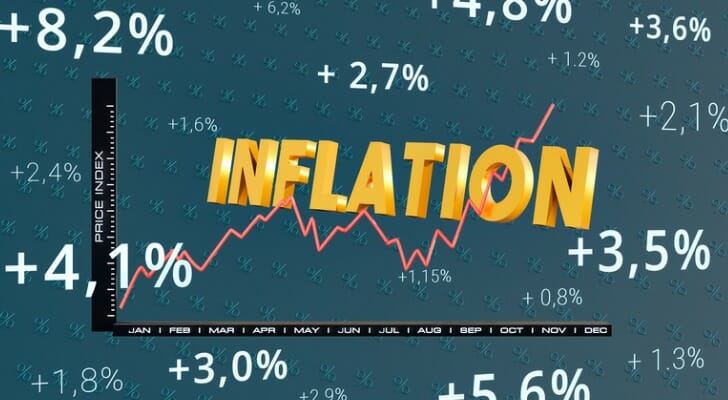 After more than 10 years of low inflation, we have seen a surge in inflation. A myriad of factors has converged to trigger inflation, including pandemic-related lockdowns, a massive monetary and fiscal stimulus and supply chain disruptions. Here’s an overview of how inflation affects equities and what kind of investing style does best during investing. Consider working with a financial advisor as you adjust your portfolio to better handle inflation.
After more than 10 years of low inflation, we have seen a surge in inflation. A myriad of factors has converged to trigger inflation, including pandemic-related lockdowns, a massive monetary and fiscal stimulus and supply chain disruptions. Here’s an overview of how inflation affects equities and what kind of investing style does best during investing. Consider working with a financial advisor as you adjust your portfolio to better handle inflation.
What Is Inflation?
Inflation occurs when prices for goods and services go up across an entire sector over a significant period of time. The most widely used measure of inflation is a rate called the Consumer Price Index, or the CPI. The most widely cited measures prices without including energy and food. This is because energy and food prices tend to fluctuate far more dramatically than other goods and services.
One cause of inflation is a large expansion of the money supply. Normally the Federal Reserve expands the money supply, which includes outstanding currency and liquid assets. From 2015 until March 2020 it expanded the money supply between 3% and 5% each month. But in March 2020 it began expanding the money supply approximately 20% each month. By August 2020 the Fed had expanded the money supply by 9.24%. Heavy expansion of the money supply continued until March 2021, at which point the central bank started trimming such increases.
Several other factors besides expanding the money supply are associated with inflation, including a growing economy, increased regulation, supply-chain disruptions and exchange-rate fluctuations. After a massive fiscal as well as monetary response to the pandemic, economic demand that had been pent up due to lockdowns was unleashed, and in 2021 it began soaring. By February 2022, inflation had jumped to 7.9% – the highest in 40 years.
How Inflation Affects Share Prices
Inflation affects equities in three ways, corporate profits, consumer spending and the overall economy.
Corporate performance
Inflation increases prices of inputs to the production process, like raw materials, labor and overhead just like it increases the price of items at the grocery. Due to higher prices for inputs, companies experience lower profit margins, which negatively impacts stock prices.
Consumer spending
Since inflation reduces consumers’ purchasing power, they often don’t have as much money to buy as many consumer discretionary items as usual. Thus, rising prices reduce the demand for the goods and services sold by companies, which decreases corporate revenue and lowers net income.
Overall economy
At such a point as inflation becomes both acute and chronic, the central bank intervenes by raising interest rates. That increases the cost of borrowing. More expensive borrowing tends to reduce corporate willingness to take out loans and face more and more costly debt service.
Expectations

Then there is the psychological factor. In the minds of investors, these effects from inflation reduce the perceived present value of future cash flows from the stock. Stock prices, at least in the short term, are largely a function of investor expectations, and if they perceive the present value of future cash flows to be lower, they will act in a way that makes them lower. As a result, stock prices drop.
How to Respond to Inflation
Inflation should cause investors to consider – or reconsider – both their investing style and the specific types of securities in their portfolio.
Value investing
The investment style that tends to do relatively well during inflation is value investing. Unlike growth investing, value investing entails the practice of identifying and buying whose intrinsic value, as determined by fundamental analysis, significantly lags their share price. Value stocks often have a relatively low price/earnings ratio and strong free cash flow.
For more than a decade growth investing has outperformed value investing. That’s attributable to the Federal Reserve’s easy money policy. In December 2008, the Federal Reserve dropped interest rates to near zero and kept them there throughout the recovery from the global financial crisis. It wasn’t until December 2015 when the Federal Open Market Committee hiked the target federal funds rate above the 0% to .25% range for the first time since December 2008. During this time, the Federal Reserve also expanded its purchase of longer-term securities in an effort to bring down longer-term interest rates and increase economic activity.
While the target rate steadily rose in subsequent years and reached 2.25% to 2.50% in late 2018, the low-interest environment returned at the onset of the COVID-19 pandemic. The Federal Reserve slashed rates twice in March 2020 in response to the economic turmoil the pandemic unleashed, dropping the target federal funds rate back between 0% and 0.25%. It’s remained near zero since then.
But with as many as three Fed rate hikes expected in 2022, the era of easy money may be over. That’s bad news for growth stocks but good news for value stocks.
Inflation Hedges
Besides opting for a value investing style, there are several types of securities that make wise inflation hedges. They include small-cap, dividend growth, consumer staples, financial and energy are showing up on many recommended lists. Also getting the thumbs-up are industries experiencing post-pandemic rebounds, particularly, travel, leisure and hospitality.
Real estate is another tried-and-true inflationary hedge. Residential real estate, in particular, is seen as a haven for 2022. Home construction and building materials are also getting recommended as inflation-busters. Real estate investment trusts (REITs), publicly companies that own real estate or mortgages, offer a way to invest in real estate without actually buying properties.
An investment in commodities may be one of the most powerful inflation hedges. Raw materials agricultural products can be traded like securities. Commodities traders commonly buy and sell gold and other precious metals, oil, natural gas, grain, beef and coffee, among others. Investors can direct portions of the portfolios into commodities using futures and options contracts and through investments in exchange-traded funds and mutual funds.
The Bottom Line

In inflationary times, value investing is often preferred to growth investing due to lower risk, lower share prices and dividend income. Value stocks tend to perform better in an inflationary environment while growth stocks may exhibit superior performance in a low interest rate, low inflation situation. Combining value investing with picking inflation-resistant securities is a wise course of action.
Tips on Investing
- A financial advisor can help you develop a portfolio that both reflects your goals, timeline and risk profile as well as inflation. Finding a qualified financial advisor doesn’t have to be hard. SmartAsset’s free tool matches you with up to three financial advisors who serve your area, and you can interview your advisor matches at no cost to decide which one is right for you. If you’re ready to find an advisor who can help you achieve your financial goals, get started now.
- To help you choose a portfolio that is reflective of your risk tolerance, use SmartAsset’s asset allocation calculator. It will help you decide what percentage of your portfolio. each stock should be.
- Planning your investment strategy includes planning for taxes. If you want to see what impact your capital gains will have, use our no-cost capital gains calculator.
Photo credit: ©iStock.com/Torsten Asmus, ©iStock.com/photoschmidt, ©iStock.com/porcorex